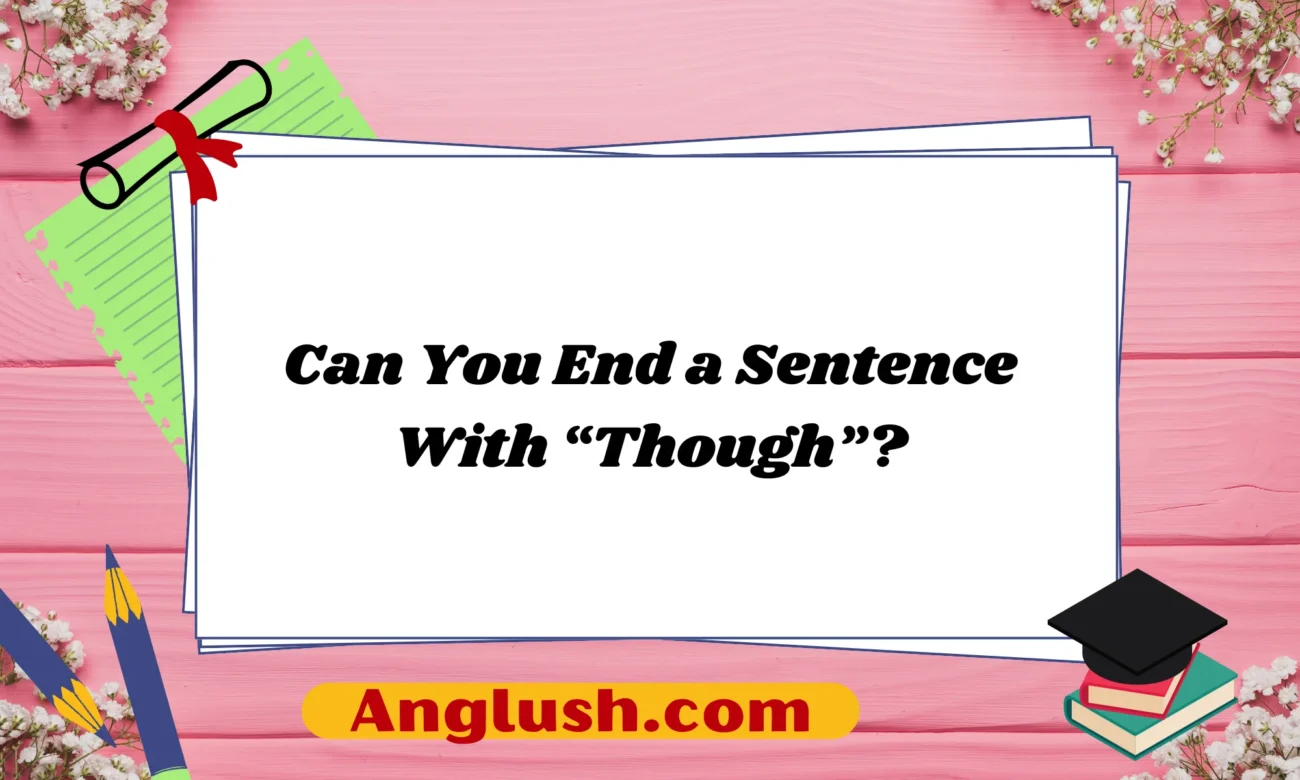Introduction
English is a complex language filled with nuances, and one common question that often arises is whether it’s appropriate to end a sentence with the word “though.” The short answer is yes, but its usage depends on context, tone, and sentence structure. While “though” is perfectly acceptable in casual and conversational writing, it may not always be suitable in formal or professional settings.
This article explores the different ways “though” is used, its nuances in tone, and alternative phrases that can be used in both formal and informal contexts. We will also provide ten texting examples to help you understand its practical application.
Understanding the Use of “Though” at the End of a Sentence
“Though” is a conjunction and an adverb that can be used to contrast ideas. When placed at the end of a sentence, it softens the statement or adds an implied contrast.
Examples of “Though” at the End of a Sentence
- I’m not sure I can make it to the party tonight. I’ll try, though.
- The restaurant was fully booked. We got a table, though!
- It’s expensive. It’s worth it, though.
- She didn’t agree with me. She listened, though.
- The weather isn’t great. We’ll still go for a walk, though.
In these examples, “though” introduces a slight contradiction or concessional tone, making the sentence sound more natural and conversational. However, in formal writing or professional settings, there may be better alternatives.
Polite and Professional Alternatives to “Though”
In formal writing, using “though” at the end of a sentence might seem too casual. Instead, consider these alternatives:
1. However
Example: The project was delayed. However, we are still on track to meet our deadline.
🔹 “However” sounds polished and is widely used in professional and academic writing.
2. Nevertheless
Example: The event faced some challenges. Nevertheless, it was a success.
🔹 This alternative maintains a sophisticated tone and conveys persistence despite difficulties.
3. Yet
Example: The proposal had some flaws. Yet, it was approved.
🔹 “Yet” is concise and effective in contrasting ideas in professional settings.
4. Even so
Example: The price is high. Even so, it’s a great investment.
🔹 This phrase is slightly more formal than “though” but still conversational.
5. Still
Example: The traffic was terrible. Still, we arrived on time.
🔹 “Still” is a simple and professional alternative that maintains a natural tone.
Casual Alternatives to “Though”
For informal conversations, especially in texting, “though” is commonly used. However, you can also use these casual alternatives:
1. But still
Example: I’m exhausted. But still, I had a great time.
2. Even then
Example: The tickets sold out fast. Even then, I managed to get one!
3. Yet again
Example: I forgot my keys. Yet again, my neighbor saved me.
4. Either way
Example: I’m not sure what to do. Either way, it’ll be fine.
5. That said
Example: It’s not my favorite movie. That said, it was entertaining.
How to Choose the Best Alternative
✅ When to Use “Though”
- Casual conversations
- Texting and informal writing
- Softening a statement or contradiction
✅ When to Avoid “Though”
- Professional emails and business communication
- Academic writing
- Formal documents
✅ Choosing the Right Alternative
| Context | Recommended Alternative |
| Business Emails | However, Nevertheless |
| Academic Papers | Yet, Even so, Still |
| Friendly Conversations | But still, Either way, That said |
| Text Messages | Though, Even then, Yet again |
10 Texting Examples for “Though” and Alternatives
To make your messages sound natural and engaging, here are ten texting examples using “though” and its alternatives:
- I didn’t love the movie. It was fun to watch, though.
- I can’t meet up today. I’ll call you later, though!
- That pizza was overpriced. It was delicious, though.
- The WiFi is slow. At least we can still chat, though.
- She didn’t say much. She seemed happy, though.
- I don’t feel like going out. But still, I might change my mind.
- The dress is out of stock. Even then, I’ll keep looking.
- I’m not great at cooking. Either way, I’ll give it a try!
- I don’t usually like horror movies. That said, this one was good.
- I thought I’d be late. Yet again, I made it just in time.
These examples enhance readability and help you choose the right phrase based on your tone and intention.
Final Thoughts
Ending a sentence with “though” is completely grammatically correct and widely used in informal speech and writing. However, in formal or professional contexts, using alternatives like “however,” “nevertheless,” or “even so” can make your writing more polished and sophisticated.
By understanding these nuances, you can communicate more effectively and choose the right words for any situation. Whether you’re texting a friend, writing an email, or crafting a professional report, knowing when and how to use “though” can improve your writing clarity and tone.

